英语6种常用时态的被动语态
英语语法被动语态总结
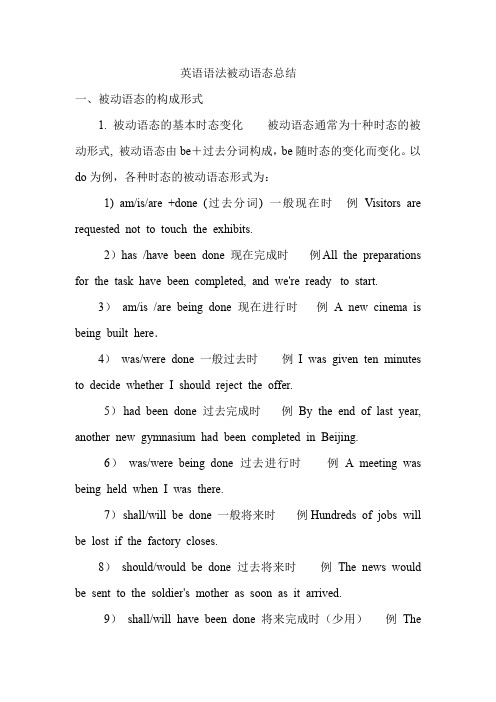
英语语法被动语态总结一、被动语态的构成形式1. 被动语态的基本时态变化被动语态通常为十种时态的被动形式, 被动语态由be+过去分词构成,be随时态的变化而变化。
以do为例,各种时态的被动语态形式为:1) am/is/are +done (过去分词) 一般现在时例Visitors are requested not to touch the exhibits.2)has /have been done 现在完成时例All the preparations for the task have been completed, and we're ready to start.3)am/is /are being done 现在进行时例 A new cinema is being built here.4)was/were done 一般过去时例I was given ten minutes to decide whether I should reject the offer.5)had been done 过去完成时例By the end of last year, another new gymnasium had been completed in Beijing.6)was/were being done 过去进行时例 A meeting was being held when I was there.7)shall/will be done 一般将来时例Hundreds of jobs will be lost if the factory closes.8)should/would be done 过去将来时例The news would be sent to the soldier's mother as soon as it arrived.9)shall/will have been done 将来完成时(少用)例Theproject will have been completed before July.2. 被动语态的特殊结构形式1)带情态动词的被动结构。
被动语态

二、不能用于被动语态的及物动词或动词短语:
fit, marry, own, wish, cost, agree with, arrive at / in, succeed in, happen to, take part in, belong to
The question is easy to answer. 这问题容易回答。
That book is difficult to understand. 那本书难懂。
在这种句型结构中,动词不定式和主语的关系实际上是一种逻辑上的动宾关系,可以说是动词不定式作主语变换来的,相当于It’s easy to answer the question.和It’s difficult to understand that book.由于把动词宾语放在主语位置,所以和不定式的关系构成一种被动关系。
The door has already/just been locked.门已经/刚刚被锁上。(被动语态)
The shop is opened.这家商店开门了。(系表结构)
The shop is opened at 8 a.m. everyday.这家商店每天上午八点开门。(被动语态
That book smells old.那本书有一股霉味。
These oranges taste nice.这些橙子味道很好。 以上这些动词都不能用进行时表示。若用进行时,则表示主动含义。比较:The child is smelling the paint.小孩正在闻油漆的气味。九、在need(want, require, deserve, etc.)doing句型中,动名词(doing)相当于动词不定式的被动式(to be done),在意思上没有多大差别。例如:
被动语态
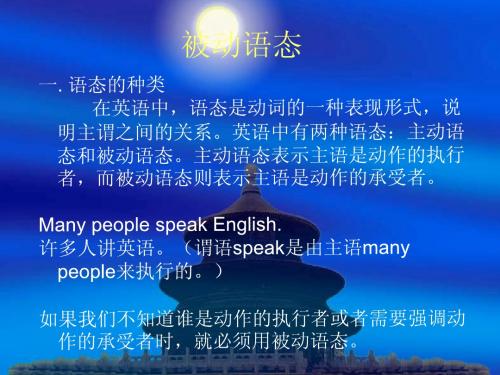
We keep food fresh in the fridge. Food is kept fresh in the fridge.
C. 除了单一的及物动词可以用于被动语态外,一些相 当于及物动词的 “动词+副词/介词” 短语也可以用 于被动语态,此时一定不要把介词或副词遗漏。
He turned on the radio. ---- The radio was turned on by him. Who is taking care of your baby. --- By whom is your baby being taking care of?
Байду номын сангаас
六.主动语态变被动语态应注意的一些问题 A.含有双宾语的句子的被动语态
一些动词如give, buy 等,后面常跟两个宾语---直接宾语和间接宾语。通常直接宾语指物,间接 宾语指人;指人或物的宾语都可以作为被动语态 句子的主语。
He gave her a watch. 他给了她一块手表。 She was given a watch by him. (以人she作主语) A watch was given to her by him. (以物watch作主语)
A.动作的执行者不确定。
Many people are killed in traffic accidents every year.
B. 不必表明动作的执行者
Our class meeting will be put off until next Monday.
C. 动作的执行者为一般大众
Trees should be planted every year.
3. 为了强调动作的执行者而用by修饰。 The window was broken by the boy who lives next door. 窗子是住在隔壁的男孩打破的。 4. 出于礼貌措辞等原因不愿说出动作的执行者时。 You are invited to a party at eight tomorrow. 你被邀请参加明天八点的晚会。 You are wished to do it more carefully. 希望你做得再认真一点儿。 5. 在文章标题、广告、新闻等中常省略动词be的被动语态。 Telephone call placed. 电话接通乐。(省略了has been) Girls wanted. 招女工。(广告用语,省略了are) 6. 当动作的执行者不是人时,也往往用被动语态。 The house was washed away by the storm. 房子被暴风雨冲走了。
英语表达中的被动语态
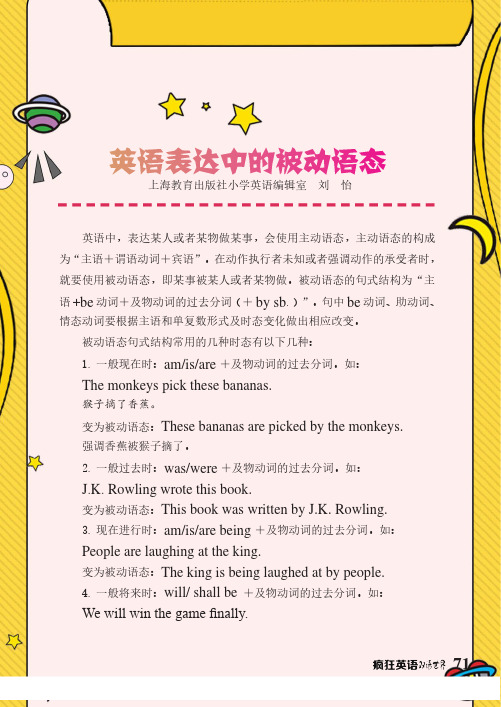
英语表达中的被动语态上海教育出版社小学英语编辑室 刘 怡英语中,表达某人或者某物做某事,会使用主动语态,主动语态的构成为“主语+谓语动词+宾语”。
在动作执行者未知或者强调动作的承受者时,就要使用被动语态,即某事被某人或者某物做。
被动语态的句式结构为“主语+be动词+及物动词的过去分词(+by sb.)”。
句中be动词、助动词、情态动词要根据主语和单复数形式及时态变化做出相应改变。
被动语态句式结构常用的几种时态有以下几种:1.一般现在时:am/is/are +及物动词的过去分词。
如:The monkeys pick these bananas.猴子摘了香蕉。
变为被动语态:These bananas are picked by the monkeys.强调香蕉被猴子摘了。
2.一般过去时:was/were+及物动词的过去分词。
如:J.K. Rowling wrote this book.变为被动语态:This book was written by J.K. Rowling.3.现在进行时:am/is/are being +及物动词的过去分词。
如:People are laughing at the king.变为被动语态:The king is being laughed at by people.4.一般将来时:will/ shall be +及物动词的过去分词。
如:We will win the game finally.7172Crazy English 变为被动语态:The game will be won by us finally.5.现在完成时:has/have been +及物动词的过去分词。
如:This book has been printed many times so far.到目前为止,这本书被印刷了很多次。
6.带情态动词的被动语态:情态动词+be +及物动词的过去分词。
如:The workers can build the hospital in ten days.变为被动语态:The hospital can be built by workers in ten days. 被动语态具有其他特殊的用途,通过上面大量的例子我们可以总结一下被动语态的用法。
被动语态

一.知识点1.被动语态的谓语动词形式: be的各种时态形式+v-ed含情态动词的: can/may/must/should be + v-ed2.get/have + n./pron. + v-ed 叫/让/请别人做某事(即使谋事被做)例: I want to get my coat mended. 我要缝衣服.3.allow sb to do sth 允许某人做…allow doing sth 允许做…4.drive : ①驾车,驾驶. ②驱赶,驱使.例: What drives them to rob the shop? 什么驱使他们去抢商店?5.stupid silly foolish 三个词都有“蠢”的意思.但略有不同.stupid 程度最强,指智力理解力学习能力差. silly 指头脑简单,傻头傻脑,使人觉得可笑,带有感情色彩. foolish 尤其在口语中广泛使用.例: He is stupid in learning math. 他学习数学很笨.Stop asking such silly questions. 别再问这样傻的问题了.You are foolish to throw away such a good chance. 你真蠢,丢掉这样一个好机会.6.He doesn’t seem to have many friends.=It seems tha t he doesn’t have many friends.=He seems not to have many friends.7.倒装句: So + be动词/助动词/情态动词+主语(前为肯定局) 表示与前面所述事实一致.Neither/Nor + be动词/助动词/情态动词+主语(前为否定) 表示与前面所述事实一致.例: He likes oranges. So do we. He doesn’t like oranges. Neither do we. Tom can swim. So can John.To m can’t swim. Neither can John.So +主语+ be动词/助动词/情态动词表示对前面事实的进一步确认.例: Henry is very tired. So he is.(的确是)He surfed Internet for two hours. So he did.(的确是)They will win the game. So they will.(他们会的)8.until 用于肯定句中,前面句子中的谓动必须是延续性的.9.clean (v.) 打扫,清理clean up 比较彻底地打扫,清理clean out 打扫,清理地最彻底.10.fail a test = fail in a test 考试不及格11.be strict with+人.be strict in+事物.例: The head teacher is strict with his students He isstrict in the work.12.the other day 前几天,不久前的一天.(用于过去时)13.concentrate on…全神贯注做…例: This company concentrates on China market. 这家公司把重点放在中国市场上.14. more…than…①与其说…不如说…; 比…更…例: The man is more stupid than nervous.与其说那人紧张,倒不如说他愚蠢.②在这一结构中,more做adj. 修饰名词,表示“比…多”例:I have more books than you. 我的书比你的多.15.volunteer ①n. 自愿者.②v. volunteer to do sth. 自愿做…例: We all volunteered to help in the old people’s home.我们都志愿到敬老院帮忙.16.chance 指侥幸的,偶尔的机会,还可表示“可能性”opportunity 指有利的时机,良机. 二者有时可以互换.Have an opportunity to do sth 有做…的机会.Don’t be too frustrated. You’ll have another opportunity togo to college next year. 别太沮丧了,你还有上大学的机会.17. experience : ①可数名词“经历,体验”例: Pleasetell us something about your experiences.②不可数名词“经验”例: He is a man of rich experience.③动词“经历”例: She experienced lots of suffering.18. off 不工作,不上班,不上学,不值班.例: I think I’ll take the afternoon off. 我想下午歇班.She is off today. 她今天休息.I have three days off next week. 下周我有三天假.19. reply 与answer 两者有时可通用. reply比answer正式,一般指经过思考的.有针对性的,详细的回答,往往与to连用.answer是一般用语,可直接带宾语.另外answer还有“应答”之意.如answer the door/telephone20. get in the way (of)... 妨碍...例: He never gets in others’way. 他从不妨碍别人.The bikes over there will get in the way of others. 自行车放在那里会妨碍别人的.21. success (n.) successful (adj.) succeed (v.)22. do does did 用在另一个动词前表示强调.例: He does speak well. 他真的讲的很好.Do be quiet. 务必安静.23. in the end = finally = at last 最后.24. importance (n.) important (adj.)25. be serious about 对…热忠/极感兴趣.例: I’m serious about the problem.To tell you the truth, I’m not serious about math at all. 26. only 处于句首,并后跟状语时,全句需要倒装.例: Only then did he understand it. 只有到那时,他才明白.Only in this way can we learn English well. 只有这样我们才能把英语学好.Only when she came home, did he learn the news. 当她到家时,他才得知了这消息.27. care about 关心,在乎,在意.例: No one cares about others nowadays. 现在没人关心别人I don’t care about what he does. 我并不在意他干什么.28. clothes 统指身上穿的各种服装,包括上衣,裤子,内衣等,做主语,谓语动词按复数处理.clothing 不可数名词,是服装的总称,包括各种衣服,帽子,鞋袜等.做主语谓动按单三处理. cloth 布料.二.短语1. be allowed to do sth 被允许干…allow sb to do sth 允许某人干…allow doing sth 允许干…2. sixteen-year-olds = sixteen-year-old boys and girls 16岁的孩子3. part-time jobs 兼职工作4. a driver’s license 驾照5. on weekends 在周末6. at that age 在那个年龄段7. on school nights 在上学期间的每个晚上8. stay up 熬夜9. clean up (相当与及物动词) 清扫10. fail (in) a test 考试不及格11. take the test 参加考试12. the other day 前几天13. all my classmates 我所有的同学14. concentrate on 全神贯注于15. be good for 对…有益16. in groups 成群的,按组的17. get noisy 吵闹(系表结构) 18. learn from 向某人学习19. at present 目前,现在20. have an opportunity to do sth 有做…的机会21.English-English dictionary 英英词典22. at least 至少23.eight hours’sleep a night 每晚8小时的睡眠24. an old people’s home 敬老院25. take time to do sth 花费时间干…26. primary schools 小学27. have…off 放假,休息28. reply to 回答,答复29. get in the way of 妨碍30. a professional athlete 职业运动员31. achieve one’s dreams 实现梦想32. think about 思考,考虑33. in the end 最后,终于34. be serious about 对…热忠/极感兴趣35. spend…on + n. spend …(in) + v-ing 在…上花费时间/金钱36. care about 关心,担心,在乎37. agree with 同意…三.句子1. I don’t think twelve-year-olds should be allowed to gettheir ears pierced.我认为不应该允许12岁的孩子穿耳孔.2.They talk instead of doing homework. 他们聊天而不是做作业.3.He is allowed to stay up until 11:00 pm. 允许他们熬到晚上11点.4.We should be allowed to take time to do things like thatmore often.我们应该被允许更加经常的花些时间多做这类事情.5.What school rules do you think should be changed?你认为学校的哪些制度应该改一改了?6.The two pairs of jeans both look good on me. 这两条牛仔裤穿在我身上都适合.7.The classroom is a real mess. 教室太脏了.8.Should I be allowed to make my own decisions?9.Only then will I have a chance of achieving my dream. 只有这样我才能实现我的梦想.10.They should be allowed to practice their hobbies as muchas they want.应该允许他们对业余爱好想练多长时间就练多长时间.11.We have nothing against running. 我们没有理由反对他跑步.Unit 3 Teenagers should be allowed to choose theirown clothes九年级英语Unit31.语态:①英语有两种语态:主动语态和补动语态主动语态表示是动作的执行者被动语态表示主语是动作的承受者Cats eat fish. (主动语态)猫吃鱼。
英语各时态的主动句和被动句

一般将来时(Simple Future):主动语态:明天我将会见我的朋友。
(I will meet my friend tomorrow.)被动语态:我的朋友将被我明天见到。
(My friend will be met by me tomorrow.)主动语态:下个月我将搬到一个新的城市。
(I will move to a new city next month.)被动语态:一个新的城市将被我下个月搬到。
(A new city will be moved to by me next month.)主动语态:明年我将开始学习弹钢琴。
(I will start learning to play the piano next year.)被动语态:学习弹钢琴将被我明年开始。
(Learning to play the piano will be started by me next year.)现在进行时(Present Continuous):主动语态:我正在看电视节目。
(I am watching a TV show.)被动语态:电视节目正在被我观看。
(A TV show is being watched by me.)主动语态:他们正在制定新的计划。
(They are making new plans.)被动语态:新的计划正在被他们制定。
(New plans are being made by them.)主动语态:我们正在等待朋友的到来。
(We are waiting for our friend's arrival.)被动语态:朋友的到来正在被我们等待。
(Our friend's arrival is being waited for by us.)现在完成时(Present Perfect):主动语态:我已经完成了我的工作报告。
(I have finished my work report.)被动语态:我的工作报告已经被我完成了。
英语常用时态的被动语态

英语常用时态的被动语态(一)由“助动词be + 动词的过去分词”构成。
助动词be 有时态、人称和数的变化。
1) 一般现在时:am/is/are +过去分词。
如:Rice is grown in south China. 华南种植水稻。
2) 一般过去时:was/were+过去分词。
如:The glass was broken yesterday. 这块玻璃是昨天打烂的。
3) 现在进行时:am/is/are being +过去分词。
如:The project is being carried out. 这个计划正在执行中。
4) 过去进行时:was/were/being +过去分词。
如:This road was being built this time last year. 这条路去年这个时候还在修建。
5) 一般将来时:will be +过去分词。
如:The cars will be sent abroad by sea. 这些汽车将由水路运往国外。
6) 过去将来时:would be +过去分词awd39idv。
如:The manager said the project would be completed by the end of the year. 经理说这个工程在年底前将会完成。
7) 现在完成时:have/has been +过去分词。
如:This novel has been translated into several languages. 这本小说已被译成了几种语言。
8) 过去完在时:had been +过去分词。
如:When I got to the theatre, I found the tickets had already been sold out. 我到达剧院时,发现票已卖完了。
(二)1.一般现在时的被动语态:is(am,are)+动词过去分词。
Many courses are designed to meet the students needs.很多课程都是为了满足学生的需要而设计的。
高中英语被动语态知识点总结
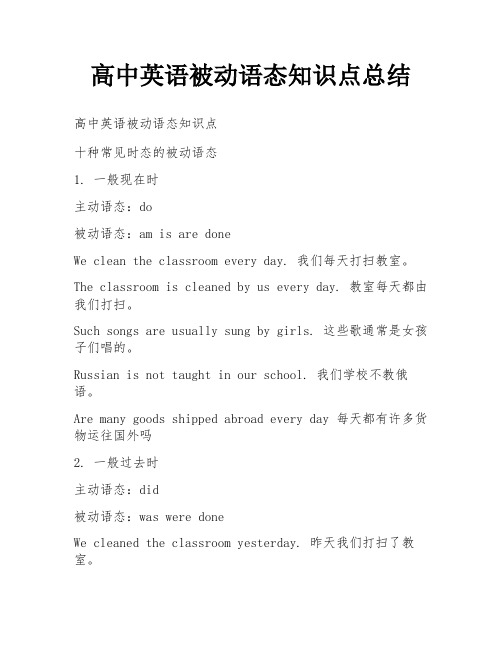
高中英语被动语态知识点总结高中英语被动语态知识点十种常见时态的被动语态1. 一般现在时主动语态:do被动语态:am is are doneWe clean the classroom every day. 我们每天打扫教室。
The classroom is cleaned by us every day. 教室每天都由我们打扫。
Such songs are usually sung by girls. 这些歌通常是女孩子们唱的。
Russian is not taught in our school. 我们学校不教俄语。
Are many goods shipped abroad every day 每天都有许多货物运往国外吗2. 一般过去时主动语态:did被动语态:was were doneWe cleaned the classroom yesterday. 昨天我们打扫了教室。
The classroom was cleaned by us yesterday. 昨天教室被我们打扫了。
The window was broken by my son. 窗子是我儿子打破的。
Were many trees planted on the hill yesterday 昨天山上种了许多树吗?How much money was stolen in all 一共被偷了多少钱?3. 一般将来时主动语态:will shall do被动语态:will shall be doneWe will clean the classroom soon. 我们很快要打扫教室。
The classroom will be cleaned soon. 教室很快要被打扫了。
The work will be done immediately. 这工作将马上做。
Will the school sports meeting be held next week? 校运动会将在下星期举行吗?When shall we be given a lecture on the Internet 什么时候给我们作有关因特网的讲座?4. 一般过去将来时主动语态:would do被动语态:would be doneWe told him that we would clean the classroom soon. 我们告诉他我们马上就打扫教室。
各种时态的被动语态

各种时态的被动语态一、八大时态的被动语态的构成:1.一般现在时的被动语态构成:(am/is/are +done)如:I am asked to study hard. 我被请求努力学习。
This shirt is washed once a week. 这件T恤一周洗一次。
These songs are usually sung by boys. 这些歌曲通常是男生唱的。
2.一般过去时的被动语态构成:(was/were done)如:The soldier was killed, but the train was saved. 这位战士牺牲了,然而列车得救了。
Some notes were passed up to the speaker. 有人给讲演者递上来一些纸条。
3.一般将来时的被动语态构成:(shall/will be done)如:We shall be asked a lot of strange questions. 我们将被问许多怪题。
My son will be sent to school next September. 来年九月我将送我儿子去读书。
4.过去将来时的被动语态构成:(should/would be done)如:The news would be sent to him as soon as it arrived. 消息一到就会转给他的。
He told us that the new railway would be built the next year. 他告诉我新铁路将在明年修建。
5.现在完成时的被动语态构成:(has/have been done)如:The work has just been finished. 工作刚刚结束。
The old rules have been done away with by us. 旧规章已经被我们废除了。
6.过去完成时的被动语态构成:(had been done)如:By last December three ships had been built by them. 到去年十二月底他们已建造了三艘船。
各种时态的被动语态

各种时态的被动语态各种时态的被动语态一、八大时态的被动语态的构成:1.一般现在时的被动语态构成:(am/is/are +done)如:I am asked to study hard. 我被请求努力学习。
This shirt is washed once a week. 这件T恤一周洗一次。
These songs are usually sung by boys. 这些歌曲通常是男生唱的。
2.一般过去时的被动语态构成:(was/were done)如:The soldier was killed, but the train was saved. 这位战士牺牲了,然而列车得救了。
Some notes were passed up to the speaker. 有人给讲演者递上来一些纸条。
3.一般将来时的被动语态构成:(shall/will be done)如:We shall be asked a lot of strange questions. 我们将被问许多怪题。
My son will be sent to school next September. 来年九月我将送我儿子去读书。
4.过去将来时的被动语态构成:(should/would be done)如:The news would be sent to him as soon as it arrived. 消息一到就会转给他的。
He told us that the new railway would be built the next year. 他告诉我新铁路将在明年修建。
5.现在完成时的被动语态构成:(has/have been done)如:The work has just been finished. 工作刚刚结束。
The old rules have been done away with by us. 旧规章已经被我们废除了。
中考英语各种时态的被动语态举例知识点总结
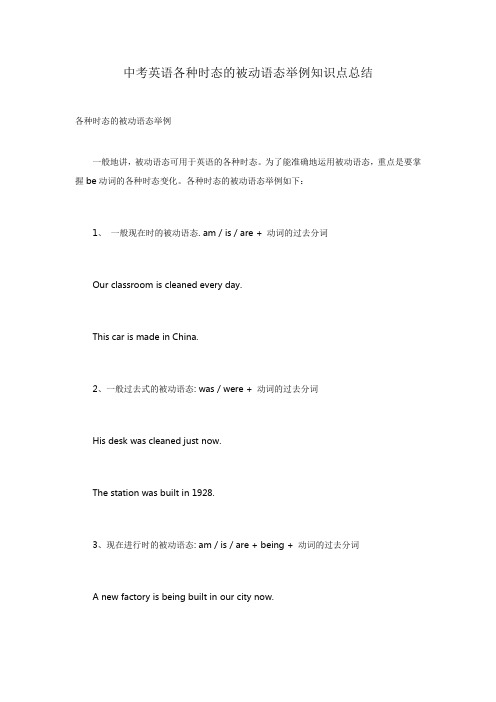
中考英语各种时态的被动语态举例知识点总结各种时态的被动语态举例一般地讲,被动语态可用于英语的各种时态。
为了能准确地运用被动语态,重点是要掌握be动词的各种时态变化。
各种时态的被动语态举例如下:1、一般现在时的被动语态. am / is / are + 动词的过去分词Our classroom is cleaned every day.This car is made in China.2、一般过去式的被动语态: was / were + 动词的过去分词His desk was cleaned just now.The station was built in 1928.3、现在进行时的被动语态: am / is / are + being + 动词的过去分词A new factory is being built in our city now.Some trees are being cut down in the park.4、过去进行时的被动语态: was / were + being + 动词的过去分词A new factory was being built in our city at that time.Some babies were being looked after by Miss Chen last year.5、一般将来时的被动语态:(A) will / shall + be + 动词的过去分词(B) am / is / are + going to be +动词的过去分词.Some new factories will be built in our city this year.Your watch is going to be mended in an hour.6、过去将来时的被动语态: (1).would / should + be + 动词的过去分词(2).was / were +going to be + 动词的过去分词.She said that some new factories would be built soon in our city.He thought that your watch was going to be mended after an hour.7、现在完成时的被动语态:have / has + been + 动词的过去分词Some new factories have been built in the city since last year.Your watch has been mended already.8、过去完成时的被动语态:had + been + 动词的过去分词He said that some new factories had been built in the city.I didn’t know that my watch had been mended .9、含情态动词的被动式:can/may/must + be + done例如:He can not be found. / I must be paid for this.。
高考英语语法专项:十种常见时态的被动语态
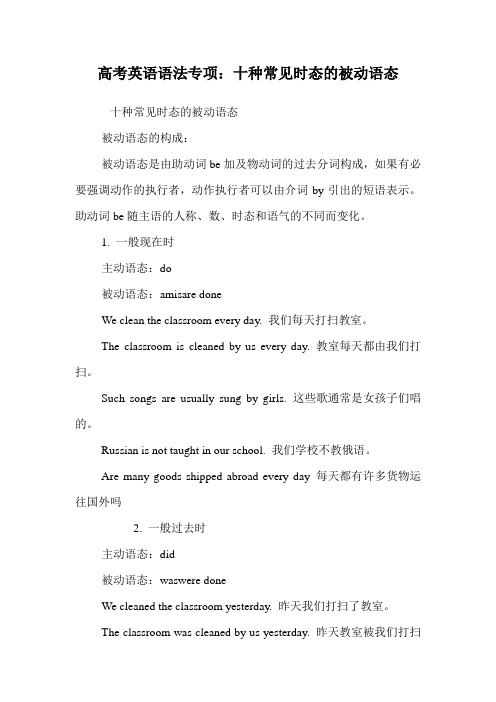
高考英语语法专项:十种常见时态的被动语态十种常见时态的被动语态被动语态的构成:被动语态是由助动词be加及物动词的过去分词构成,如果有必要强调动作的执行者,动作执行者可以由介词by引出的短语表示。
助动词be随主语的人称、数、时态和语气的不同而变化。
1. 一般现在时主动语态:do被动语态:amisare doneWe clean the classroom every day. 我们每天打扫教室。
The classroom is cleaned by us every day. 教室每天都由我们打扫。
Such songs are usually sung by girls. 这些歌通常是女孩子们唱的。
Russian is not taught in our school. 我们学校不教俄语。
Are many goods shipped abroad every day 每天都有许多货物运往国外吗2. 一般过去时主动语态:did被动语态:waswere doneWe cleaned the classroom yesterday. 昨天我们打扫了教室。
The classroom was cleaned by us yesterday. 昨天教室被我们打扫了。
The window was broken by my son. 窗子是我儿子打破的。
Were many trees planted on the hill yesterday 昨天山上种了许多树吗?How much money was stolen in all 一共被偷了多少钱?3. 一般将来时主动语态:willshall do被动语态:willshall be doneWe will clean the classroom soon. 我们很快要打扫教室。
The classroom will be cleaned soon. 教室很快要被打扫了。
高中英语被动语态
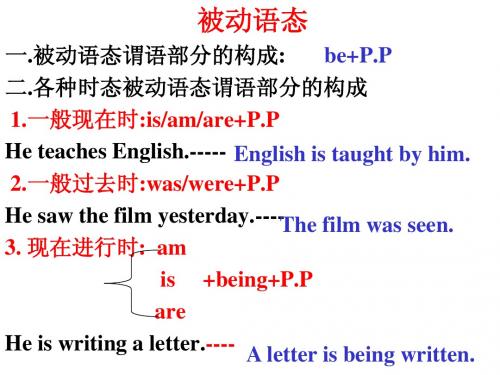
2). be going to be done We are going to finish the work on time. The work is going to be done by us on time. 8.含有情态动词的被动语态: can/may/must…be +P.P We must love our hometown. Our hometown must be loved by us. 9.特殊结的被动语态: have/has to be done seem to be done want sth to be done happen to be done ask sth to be done pretend to be done be happy to be done let sth be done
据说她要嫁给一个外国人。
It is rumored that he has been appointed as successo to the president of our company .
据传闻,他已任命为我们公司总裁的接班人了。
It is generally considered impolite to ask one’s age, salary, marriage, etc. 问别距太远而显得句 子松散,因为它的定太长了。)这个提议特别遭到了那些在
本地区投资很大的人的反对。
4.这里我们还要进一步谈谈几种特殊的被动结构。 1)关于带情态动词的被动结构 带情态动词的被动结构的固定句式为“情态动词 + be + 过去分词”。也有个别带“to”的情态动 词例外,如:ought to和have to ,它们的被动结 构就只能在不定式中,即ought/have to be done
被动语态

一、被动语态一、主动语态和被动语态在英语中,动词有两种语态,即主动语态(The Active Voice)和被动语态(The Passive Voice)。
主动语态表示主语是动作的执行者,被动语态表示主语是动作的承受者。
被动语态+构成:be+dore.注:谓语动词必须是及物动词,其执行者可由by引出,“被,由”往往放在句末,如不强调动作的执行者时可省略。
Many people speak English.(主动语态) 许多人讲英语。
English is spoken by many people.(被动语态)英语被许多人讲。
二、各种时态的被动语态形式归纳。
一般时态进行时态完成时态现在am(is, are)+done am(is, are)+being done has(have)+been done过去was(were)+done was(were)+being done Had been done将来shall(will)+ be done shall(will)+have been done过去将来should(would)+be doneshould(would)+have beendone含有情态动词can/should/must/could/may be done三、主动语态变被动语态的方法。
(可举例说明)主动语态变被动语态的方法:将主动句的宾语变成主语,将主动句的谓语变成被动式“be+及物动词的过去分词”,主动句的主语变成被动句中by的宾语(或省略)。
看下面表格:①如果主动句中有两个宾语(直接宾语和间接宾语),可以把其中一个变成被动句的主语。
注:如果将直接宾语变为被动句的主语,那么保留下来的间接宾语前需添加介词to或for.My teacher gives me a lot of books.(主动语态)我的老师给我许多书。
主语谓语间宾直宾被动语态:I am given a lot of books by my teacher.被动语态:A lot of books are given to me by my teacher.②有些不及物动词加介词构成及物动词短语,如果变被动语态,不能把动词后的介词丢掉。
高中十种时态及被动语态

精心整理高二暑期课程一高考十种英语时态及被动语态知识梳理十种时态一.一般现在时1)经常性或习惯性的动作,常与表示频度的时间状语连用。
时间状语:every…,sometimes,at…,onSunday等。
Ileavehomeforschoolat7everymorning.2)客观真理,客观存在,科学事实。
Theearthmovesaroundthesun.3)表示格言或警句中。
Pridegoesbeforeafall.Columbusprovedthattheearthisround.4)现在时刻的状态、能力、性格、个性。
AnnWangwritesgoodEnglishbutdoesnotspeakwell.5)一般现在时表将来,主要用来表示在时间上已确定或安排好的事情,或用在倒装句中。
Thetrainleavesatsixtomorrowmorning.Herecomesthebus.=Thebusiscoming.WhenBillcomes,askhimtowaitforme.I'llwritetoyouassoonasIarrivethere.二、一般过去时的用法1)在确定的过去时间里所发生的动作或存在的状态。
时间状语有:yesterday,lastweek,anhourago,theotherday,in1982等。
Wheredidyougojustnow?IsawTominthestreetyesterday.2)表示在过去一段时间内,经常性或习惯性的动作。
WhenIwasachild,Ioftenplayedfootballinthestreet.3)用过去时表示现在,表示语气委婉礼貌。
Didyouwanttospeaktomenow?Iwonderedifyoucouldhelpme.Couldyoulendmeyourbike?4)用在虚拟语气中。
IfIwereabird,IwouldflytoBeijing.特殊句式◎Itistimeforsb.todosth“到……时间了;该……了”,Itistimesb.didsth.“时间已迟了;早该……了”,例如:Itistimeforyoutogotobed.你该睡觉了。
英语的16种时态、被动语态和例句分类总结

英语的16种时态,及其被动语态(be + V过去分词)。
1.一般现在时用原形V 或 V+esI often watch TV.我经常看电视。
TV is often watched by me.电视经常被我观看。
2.一般过去时用动词过去时I watched TV just now.我刚才还在看电视。
TV was watched by me just now.电视刚才被我看。
3. 一般将来时 will + 动词原形或be going to + 动词原形I will visit the zoo on Sunday.我星期天要去动物园。
The zoo will be visited by me on Sunday.这个动物园在星期天要被我参观。
(注意这里will可以用is going to代替)4. 过去将来时 would + 动词原形或 was/were going to + 动词原形Yesterday he told me he would visit the zoo next Sunday.昨天他告诉我他下个星期天要去动物园。
Yesterday he told me the zoo would be visited by him next Sunday. (单被动)Yesterday I was told by him the zoo would be visited by him next Sunday. (双被动) (注意,这里would 可以用 was going to 代替)5. 现在进行时 be + vingI am watching TV.我正在看电视。
TV is being watched by me.电视正在被我看。
6. 过去进行时 was/were + vingI was watching TV when you came in.当你进来的时候,我正在看电视。
TV was being watched by me when you came in. 当你进来的时候,电视正在被我看。
英语时态结构及被动语态

被动语态比较主动语态与被动语态:(主动)The office (被动)(主动)The office was (被动)1、一般现在时的被动结构:am/is/are+done(过去分词)如:People in China speak Chinese. Chinese is spoken by people in China.2、一般过去时的被动结构:was/were+done如:Tom bought some cakes. Some cakes were bought by Tom.3、一般将来时的被动结构:shall/will be done.如:Our school will hold a sports meeting. A sports meeting will be held by our school.4、情态动词的被动结构:must/may/can/need/should+be done.如:We must send her to hospital. She must be sent to hospital by us.5、现在完成时的被冻结构:have/has been done.如:He has learned many words. Many words have been learned by him.6、现在进行时的被动结构:am/is/are being done如:the office is being cleaned at the moment.比较主动语态与被动语态(主动)The door is being painted7、感官动词没有被动,总是用于一般现在时或一般过去时基本时态1、一般现在时:用来表示一般性的事实或有时或往往发生的事情主语+动词标志词:always/never/often/sometimes/usually 等频度副词如:I like big cities. I don't like big cities.The shop open at 9 o'clock and close at 5.30.Sue always arrives at work early.I usually go to work by car but sometimes I walk.2、现在进行时am/is/are+doing如:Tom is having a shower at the moment.You can turn off the television.I'm not watching it.这些动词不用于现在进行时:Like/love/want/know/understand/remember/depend/prefer/ hate/need/mean/believe/forget如:I'm tired.I want to go home.(而非I'm wanting)‘Do you know that girl?’‘Yes,but I don't remember her name.’3、一般过去时:主语+动词过去时如:I/we/you/they/he/she/it+watchedThey watched television yesterday evening.①否定式:可用did/didn't+动词原形如:We went to the cinema but we didn't enjoy the film.②疑问句:did+主语+动词原形如:What did your sister phone you?Where did your parents go for their holiday?4、过去进行时was/were+doing如:What were you doing at 11:30 yesterday? Were you working?In 1985 we were living in Canada.5、现在完成时:have/has+done①表示过去发生的而现在有结果的动作如:I've lost my passport. (我现在找不到我的护照)We've bought a new car.(我们现在有了一辆新车)标志词:just/already/yetWe've already met.②谈论从过去到现在的一段时间如一个人的一生时,用现在完成时(have been/have had/have played)如:Have you ever been to Japan?(从过去到现在)‘Have you been to France?’(一生中)‘No,I haven't.’现在完成进行时+ ever (疑问句中)与never比较:‘Has Ann ever been to Australia?’‘Yes,once.’(once表示“一次”) My mother has never travelled bu air.(从来没有)④gone与been比较:Bill has gone to Spain.(他现在在西班牙)Bill has been to Spain.(他去了西班牙但是现在回来了,即曾经去过/到过)6、过去完成时:had+done表示发生的时间是“过去的过去”,侧重事情的结果如:When I woke up,it had already stopped raining.I had finished reading the novel by nine o'clock last night.。
英语被动语态
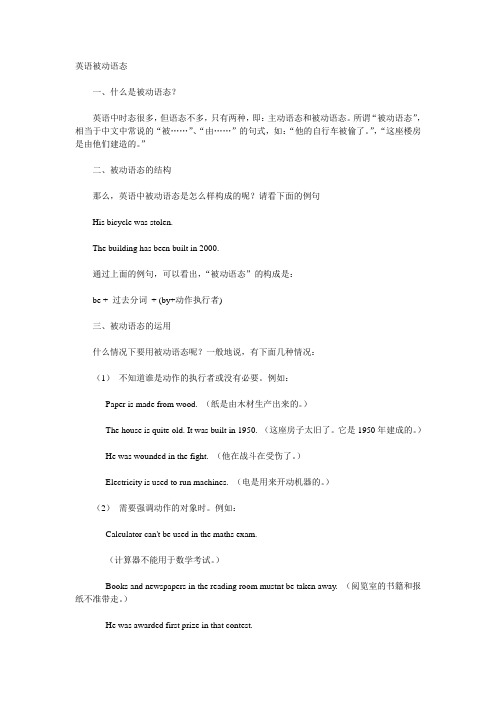
英语被动语态一、什么是被动语态?英语中时态很多,但语态不多,只有两种,即:主动语态和被动语态。
所谓“被动语态”,相当于中文中常说的“被……”、“由……”的句式,如:“他的自行车被偷了。
”,“这座楼房是由他们建造的。
”二、被动语态的结构那么,英语中被动语态是怎么样构成的呢?请看下面的例句His bicycle was stolen.The building has been built in 2000.通过上面的例句,可以看出,“被动语态”的构成是:be + 过去分词+ (by+动作执行者)三、被动语态的运用什么情况下要用被动语态呢?一般地说,有下面几种情况:(1)不知道谁是动作的执行者或没有必要。
例如:Paper is made from wood. (纸是由木材生产出来的。
)The house is quite old. It was built in 1950. (这座房子太旧了。
它是1950年建成的。
)He was wounded in the fight. (他在战斗在受伤了。
)Electricity is used to run machines. (电是用来开动机器的。
)(2)需要强调动作的对象时。
例如:Calculator can't be used in the maths exam.(计算器不能用于数学考试。
)Books and newspapers in the reading room mustnt be taken away. (阅览室的书籍和报纸不准带走。
)He was awarded first prize in that contest.(他在比赛中获得了第一。
)(3)为了使语气婉转,避免提到是谁做的这件事。
例如:The construction of the new lab must be completed by the end of next month. (新实验室必须在下个月底前完工。
(完整版)英语被动语态总结
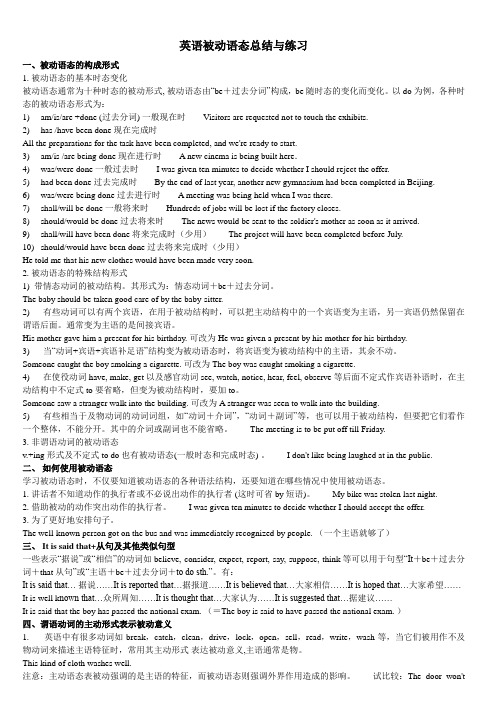
英语被动语态总结与练习一、被动语态的构成形式1. 被动语态的基本时态变化被动语态通常为十种时态的被动形式, 被动语态由“be+过去分词”构成,be随时态的变化而变化。
以do为例,各种时态的被动语态形式为:1) am/is/are +done (过去分词) 一般现在时Visitors are requested not to touch the exhibits.2) has /have been done 现在完成时All the preparations for the task have been completed, and we're ready to start.3) am/is /are being done 现在进行时 A new cinema is being built here.4) was/were done 一般过去时I was given ten minutes to decide whether I should reject the offer.5) had been done 过去完成时By the end of last year, another new gymnasium had been completed in Beijing.6) was/were being done 过去进行时 A meeting was being held when I was there.7) shall/will be done 一般将来时Hundreds of jobs will be lost if the factory closes.8) should/would be done 过去将来时The news would be sent to the soldier's mother as soon as it arrived.9) shall/will have been done 将来完成时(少用)The project will have been completed before July.10) should/would have been done 过去将来完成时(少用)He told me that his new clothes would have been made very soon.2. 被动语态的特殊结构形式1) 带情态动词的被动结构。
英语语法:被动语态用法大全
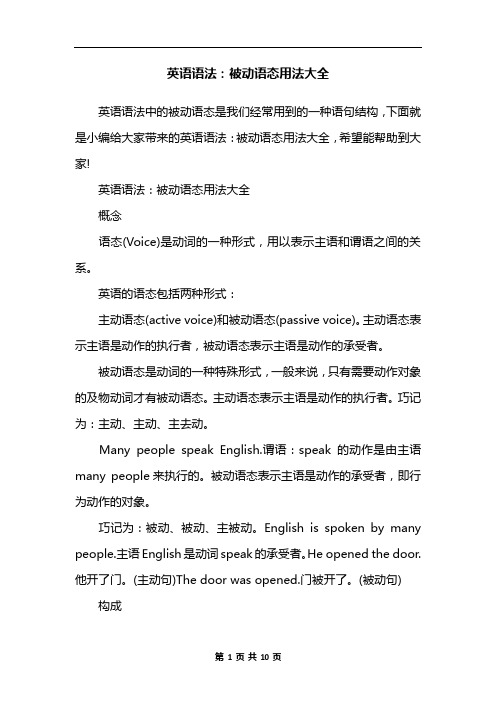
英语语法:被动语态用法大全英语语法中的被动语态是我们经常用到的一种语句结构,下面就是小编给大家带来的英语语法:被动语态用法大全,希望能帮助到大家!英语语法:被动语态用法大全概念语态(Voice)是动词的一种形式,用以表示主语和谓语之间的关系。
英语的语态包括两种形式:主动语态(active voice)和被动语态(passive voice)。
主动语态表示主语是动作的执行者,被动语态表示主语是动作的承受者。
被动语态是动词的一种特殊形式,一般来说,只有需要动作对象的及物动词才有被动语态。
主动语态表示主语是动作的执行者。
巧记为:主动、主动、主去动。
Many people speak English.谓语:speak的动作是由主语many people来执行的。
被动语态表示主语是动作的承受者,即行为动作的对象。
巧记为:被动、被动、主被动。
English is spoken by many people.主语English是动词speak的承受者。
He opened the door.他开了门。
(主动句)The door was opened.门被开了。
(被动句) 构成His bicycle was stolen.The building has been built in 2000.通过上面的例句,可以看出,被动语态的构成是:be + 过去分词( + by + 动作执行者)形式被动语态由助动词be加及物动词的过去分词构成,强调动作是由什么人或什么东西而发出时,常用介词by +行为发出者,即be+done+by+行为发出者。
被动语态可用于各种时态,通过助动词be的变化来表示:1、一般现在时的被动语态. am / is / are + 动词的过去分词Our classroom is cleaned every day.This car is made in China.2、一般过去式的被动语态: was / were + 动词的过去分词His desk was cleaned just now.The station was built in 1928.3、现在进行时的被动语态: am / is / are + being + 动词的过去分词A new factory is being built in our city now.Some trees are being cut down in the park.4、过去进行时的被动语态: was / were + being + 动词的过去分词 A new factory was being built in our city at that time.Some babies were being looked after by Miss Chen last year.5、一般将来时的被动语态:(A) will / shall + be + 动词的过去分词(B) am / is / are + going to be +动词的过去分词.Some new factories will be built in our city this year.Your watch is going tobe mended in an hour.6、过去将来时的被动语态:(1)would / should + be + 动词的过去分词(2)was / were +going to be + 动词的过去分词.She said that some new factories would be built soon in our city.He thought that your watch was going to be mended after an hour.7、现在完成时的被动语态:have / has + been + 动词的过去分词Some new factories have been built in the city since last year.Your watch has been mended already.8、过去完成时的被动语态:had + been + 动词的过去分词He said that some new factories had been built in the city.I didnt know that my watch had been mended .9、含情态动词的被动式:can/may/must + be + done(1)You must hand in your homework after class.Your homework must be handed in after class.(2)He can write a letter with the computer.A letter can be written with the computer by him. 初中英语八大时态一般现在时一般过去时一般将来时现在进行时过去进行时过去将来时现在完成时过去进行时运用第一种情况:不知道动作的执行者,就是不知道谁干的Dans bike was stolen last week. 丹的自行车上周被偷了。
- 1、下载文档前请自行甄别文档内容的完整性,平台不提供额外的编辑、内容补充、找答案等附加服务。
- 2、"仅部分预览"的文档,不可在线预览部分如存在完整性等问题,可反馈申请退款(可完整预览的文档不适用该条件!)。
- 3、如文档侵犯您的权益,请联系客服反馈,我们会尽快为您处理(人工客服工作时间:9:00-18:30)。
6种常用时态的被动语态姓名:
由“助动词be + 动词的过去分词”构成。
助动词be 有时态、人称和数的变化。
(1) 一般现在时:am/is/are +过去分词。
时间标志词:everyday/often/usually/如:
Rice is grown in south China. 华南种植水稻。
(2) 一般过去时:was/were+过去分词。
时间标志词:yesterday/just now/ago 等。
如:
The glass was broken yesterday. 这块玻璃是昨天打烂的。
(3)一般将来时:will be +过去分词。
时间标志词:tomorrow/next week等。
如:
The cars will be sent abroad by sea. 这些汽车将由水路运往国外。
(4) 现在进行时:am/is/are being +过去分词。
时间标志词:now等如:
The project is being carried out. 这个计划正在执行中。
(5)过去进行时:was/were/being +过去分词。
时间标志词:just then等如:
This road was being built this time last year. 这条路去年这个时候还在修建。
(6)现在完成时:have/has been +过去分词。
时间标志词:so far等如:
This novel has been translated into several languages. 这本小说已被译成了几种语言。
二、不能用被动语态的情况
1. 不及物动词没有被动语态
因为不及物动词没有宾语,所以若将其用于被动语态则没有主语,故不能用于被动语态。
但是值得注意的是,有些英语中的不及物动词,译成汉语时却可能是“及物”的,很容易出错,这类动词如:take place(发生),happen(发生),come about(发生),break out(爆发),appear(出现),disappear(消失),last(持续),arise(出现,发生)等:
A fire broke out during the night. 夜间发生了火灾。
2. 某些静态动词不用于被动语态
英语有些静态动词(如have, lack, fit, hold, suit, resemble 等)通常不用于被动语态,如以下各句均不能变为被动语态:
My shoes don’t fit me. 我的鞋不合适。
3. 宾语为相互代词和反身代词时不用于被动语态
由于相互代词和反身代词通常不能用作主语,所以当它们用作动词宾语时,句子不能转换成被动语态:
We should help each other. 我们应该互相帮助。
三、英语主动表被动用法归纳
1、某些连系动词(如look, sound, smell, feel, taste, prove等)要用主动表被动,因为连系动词为不及物动词,它们没有被动语态形式:
That dog looks dangerous. 那只狗看起来很危险。
2、不定式用于某些动词(如have, have got, get, want, need等)的宾语后作定语时,如果不定式的逻辑主语就是句子的主语,则要用主动形式表示被动意义:
I have some letters to write. 我有一些信要写。
I want something to drink. 我想喝点什么。
